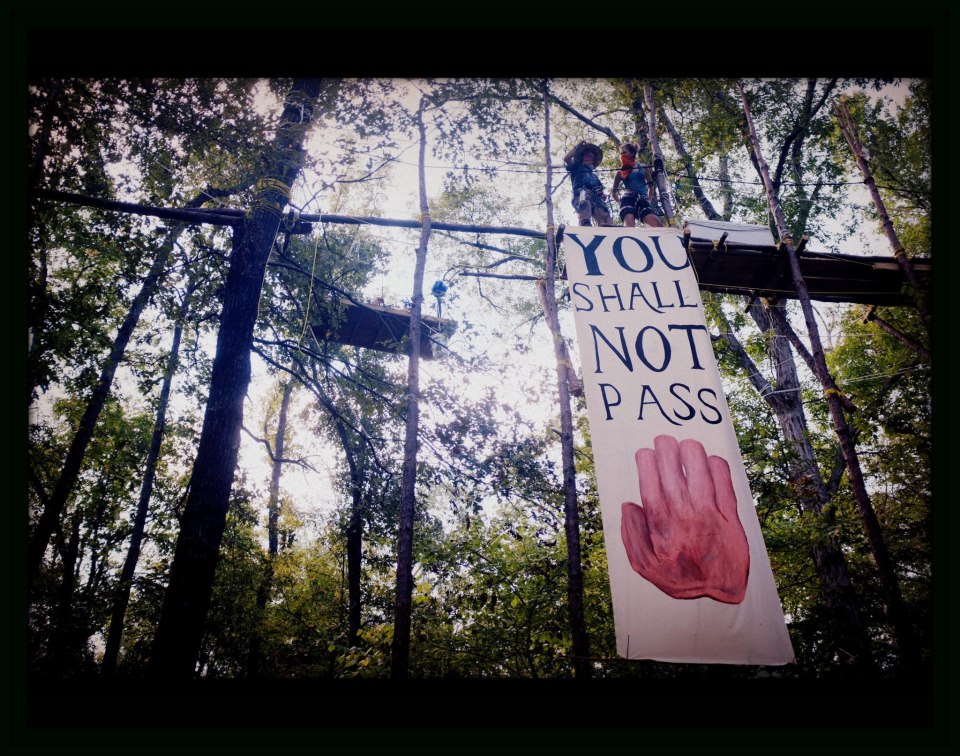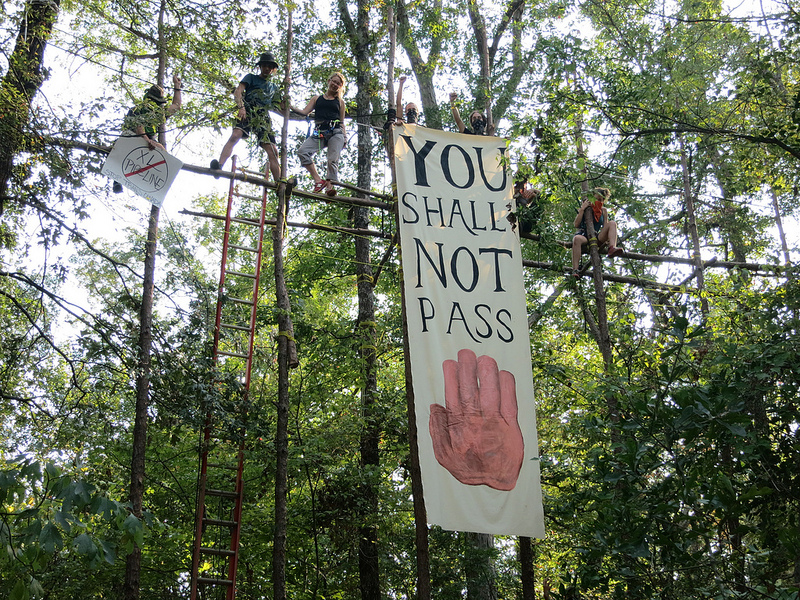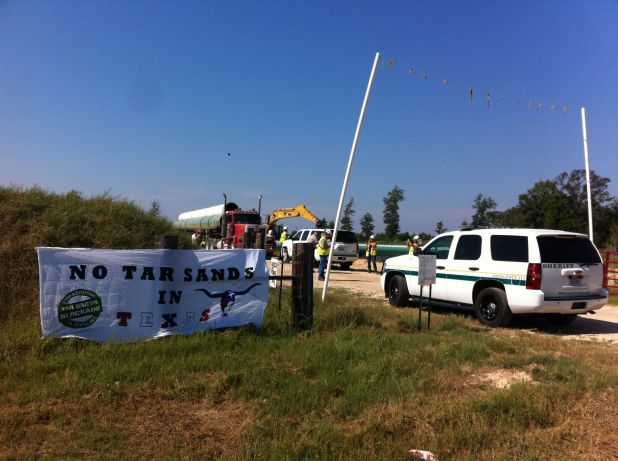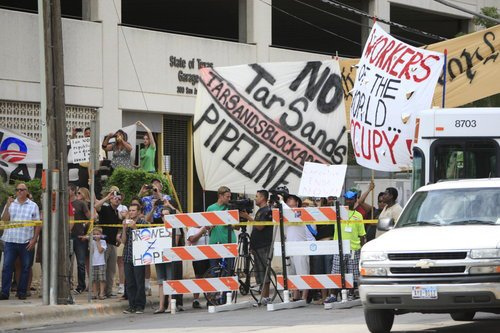
by Deep Green Resistance News Service | Oct 16, 2012 | Obstruction & Occupation
By Candice Bernd / TruthOut
More than 50 blockaders tried to re-enter the site of what has become a historic standoff Monday, to expand and support the ongoing Tar Sands Blockade tree village in east Texas.
Several managed to break through police lines to attempt to re-supply activists who have been occupying trees in the pathway of the Keystone XL pipeline since September 24. The rest of the blockaders rallied nearby, blocked by police and TransCanada’s hired security, who have formed a human barrier around the pipeline easement.
Two blockaders have locked themselves to construction equipment, and six blockaders have been arrested so far today.
Blockaders have been trying to negotiate with security hired by TransCanada to get food and water to activists occupying the trees in the path of the Keystone XL pipeline, to no avail. Now they are taking a stand together to get supplies to the activists occupying the tree-sit so they may maintain their standoff.
The activists were gathered at the location in Winnsboro after spending the weekend at a direct-action camp hosted by Tar Sands Blockade. Activists traveled from across the country and were trained in climbing, media relations, organizing and body blockade techniques.
“Coming out here had been one of the more inspiring things that I have done in years now,” says Toby Potter, a member of the environmental organization, Earth First!
Potter helped lead workshops over the weekend for camp participants in lockdowns and body blockades. “It gives me a lot of hope, seeing all this resistance from the area … and from around the country, and knowing that there’s [sic] other fights against tar sands at the same time.”
Potter helped camp participants erect a 30-foot wooden tripod used by activists who sit at the top of it during a blockade action. Many of the weekend’s campers participated in Monday’s blockade in Winnsboro to defend the tree village.
TransCanada filed a Strategic Lawsuit Against Public Participation (SLAPP) last week, naming 19 individual defendants, three organizations, and another six unidentified tree-sitters. The broad civil action seeks an injunction, declaratory relief and damages.
Most of the defendants have been arrested in previous Tar Sands Blockade actions. Ron Seifert, the Blockade’s media spokesman, was also named, although he has not yet been arrested in connection with the ongoing protest. Actor Daryl Hannah, who was arrested while defending Area Landowner Eleanor Fairchild’s home, is not named in the SLAPP suit. Fairchild, however, is named in the suit.
Another activist, going by the name Kevin Redding due to security concerns, recently escaped arrest at a secondary tree-sit the Blockade launched last week at West End Nature Preserve outside Mt. Vernon, Texas, where TransCanada had announced plans to cut trees.
“I’ve lived in Texas my whole life, and when I heard about TransCanada putting the pipeline through, I didn’t like the idea of any part of Texas having a tar sands pipeline going through it,” Redding told Truthout. “I’ve been here for a long time, and I don’t plan on going anywhere.”
Redding said local police tried to intimidate him, as he sat in a tree, with threats that he would be charged with terrorism. When company representatives said they would under-bore through the preserve, rather than cut trees in the ecologically sensitive area, the activist left the site, unobserved.
Monday’s action comes on the heels of an ongoing police crackdown not only on the tree-sitters, but also on journalists trying to tell their story. Two New York Times reporters were detained Oct. 10 while covering the tree-sit. They were released after identifying themselves as media.
Read more from TruthOut: http://truth-out.org/news/item/12121-fresh-recruits-more-arrests-begin-week-four-in-texas-tar-sands-blockade

by Deep Green Resistance News Service | Sep 26, 2012 | Obstruction & Occupation
By Tar Sands Blockade
Nine people sitting 80 feet above ground in tree platforms on the path of TransCanada’s Keystone XL construction enter their third day of sustained action to stop the toxic tar sands pipeline. The sitters are undeterred by TransCanada’s role in the torture of their fellow blockaders.
Tuesday, Shannon Bebe and Benjamin Franklin delayed construction for most of the day when they locked arms around construction machinery, intent on protecting East Texas homes. The two were subjected to torture tactics by police only after TransCanada’s senior supervisors huddled with law enforcement to actively encourage the use of extreme pain compliance techniques on the peaceful protesters.
Immediately following TransCanada’s consultation, law enforcement handcuffed the protesters’ free hands to the heavy machinery in stress positions and proceeded to use sustained chokeholds, violent arm-twisting, pepper spray, and repeated tasering to coerce the two to abandon their protest. Extraordinarily, despite their torture, the two endured for over five hours, affirming their courageous stance that taking action now is less of a risk than doing nothing.
Upon the protesters’ arrest, TransCanada supervisors were seen and heard congratulating law enforcement on a job well done.
“TransCanada has frequently claimed its interest in protecting the safety of workers and protestors but now we can see that’s all a lie,” said Ron Seifert a spokesperson with Tar Sands Blockade. “Now that they have actively encouraged the torture of peaceful protestors its clear that this multinational corporation assigns no value to the basic humanity that all Texans and people everywhere deserve.”
With the news that their friends had been tortured with TransCanada’s approval, the eight original tree sitters were bravely joined by another, expanding the tree blockade further as TransCanada’s clear-cutting heavy machinery rapidly approaches. Construction is roughly 300 yards away from the tree blockade. All refuse to come down until TransCanada halts its dangerous pipeline project.
“I climbed this tree three days ago in the path of Keystone XL to demonstrate the dangers of this toxic pipeline and to let TransCanada know that we will continue to non-violently resist their brutal tactics,” said Justin Jacobs, an aerial blockader. “I’m here to defend this land from a multinational corporation who has blatant disregard for the safety of peaceful people, families, and our planet.“
Tar Sands Blockade is a coalition of Texas and Oklahoma landowners and climate justice organizers using peaceful and sustained civil disobedience to stop the construction of the Keystone XL tar sands pipeline.
Concluding hours of hard-fought Keystone XL construction delays, Benjamin Franklin shared, “In light of everything that happened at the direction of TransCanada, I still don’t regret my involvement at all. I encourage everyone to persevere in the face of this type of sheer brutality. To follow one’s moral compass despite extreme challenges is the way we move forward towards a more humane, tar sands-free planet.”
From Tar Sands Blockade: http://tarsandsblockade.org/press/press-releases/

by Deep Green Resistance News Service | Aug 28, 2012 | Obstruction & Occupation
By Tar Sands Blockade
Just minutes ago four landowner advocates and climate justice organizers locked themselves to the underside of a massive truck carrying 36″ pipe intended for Keystone XL construction. The truck is parked, idled at the entrance of the pipeyard, rendering construction activity impossible. Seven blockaders total are onsite risking arrest. Blockaders from the Red River valley to the Gulf Coast and beyond have united to realize their collective vision of a world without toxic tar sands pipelines. Today’s message is clear: the people are rising up to defend their homes.
This act of peaceful civil disobedience comes in the wake of a recent court decision condoning TransCanada’s use of eminent domain for private gain. Last week Lamar County Judge Bill Harris ruled in a shockingly abbreviated fifteen-word summary judgment that Texas farmer Julia Trigg Crawford cannot challenge TransCanada’s claim that it is entitled to a piece of her home. The underwhelming ruling was emailed to Ms. Crawford’s attorney late in the evening of August 15 from the Judge’s iPhone.
The arrogant disregard levied at landowners like Julia Trigg Crawford for simply not consenting to have a tar sands pipeline permanently bisect their homes is what motivated Houston businessman Ray Torgerson to take action with the Blockade. “The fact that this corporation can check a box on a form and steal someone’s land is insulting,” Ray says. “We are here to defend our homes and stand with landowners like Julia.”
Further emblematic of the disrespect small town families like the Crawfords have faced throughout Keystone XL legal proceedings, Ms. Crawford received first notice of the ruling from a reporter seeking comment who had been blind carbon copied on the County Judge’s email ruling.
“It was heartbreaking to hear a generational family farm like the Crawford’s can be taken away by a multinational corporation,” exclaims blockader Audrey Steiner, a linguistic anthropologist from Austin. “I’m here to change the direction our country is taking.”
The concerns of the blockaders today go well beyond TransCanada’s appalling contempt for property rights. As Tammie Carson, a lifelong Texan living in Arlington explains, “I’m doing this for my grandchildren. I’m outraged that multinational corporations like TransCanada are wrecking our climate. The planet isn’t theirs to destroy, and I’m willing to take a risk to protect my grandchildren’s future.”
Denny Hook, a retired minister from Gainesville, Texas, describes himself as “An environmentalist that happens to be a minister.” In taking action today, Hook hopes to inspire more people to join the movement. “Things are so dire that if all of us don’t rise up we won’t make it. This pipeline is the difference between Earth on the edge and Earth over the edge.”
Tar Sands Blockade is a coalition of Texas and Oklahoma landowners and climate organizers using peaceful and sustained civil disobedience to stop the construction of Keystone XL.
“The blockade is an expression of people who have spent years using every available avenue afforded to them, and nothing has worked,” explains Tar Sands Blockade spokesperson Ron Seifert. “The urgency of this crisis is galvanizing supporters who understand that doing nothing involves a greater risk than taking action.”
From Tar Sands Blockade: http://tarsandsblockade.org/press/press-releases/

by Deep Green Resistance News Service | Aug 15, 2012 | Climate Change, Obstruction & Occupation
By Will Wooten / Waging Nonviolence
One year after more than 1,200 people were arrested in front of the White House during two weeks of sit-ins against the Keystone XL tar sands oil pipeline, a coalition of Texas landowners and activists will attempt to physically halt its construction. Led by veteran climate justice organizers, participants ranging from environmentalists to Tea Partiers are preparing to lock arms for a sustained nonviolent civil disobedience campaign, beginning perhaps as early as this week.
The impetus for such action, which is being called the Tar Sands Blockade, goes back much further than last summer, however. In 2008 and 2009, small landowners along the pipeline’s route in rural Texas, Oklahoma and Nebraska started noticing survey stakes with orange tape marked “KXL.” They soon found out that TransCanada — the company building the pipeline — had eminent domain power over their property and that if they didn’t sign a contract allowing TransCanada to build, they would be taken to court.
Many landowners, feeling pushed into an impossible situation, signed the contracts. Some began organizing, doing community outreach to explain what was happening and building conservative support on the ground. Organizations such as Nacogdoches Stop Tarsands Oil Pipelines evolved out of conversations between landowners — first focusing around eminent domain, but then, when they learned that tar sands oil would be pumped through the pipeline, discussion started to include environmental impacts, such as toxic diluted bitumen and climate change.
By August 2011, the climate movement in the United States started to focus in on the Keystone XL with Tar Sands Action, a civil disobedience campaign led by Bill McKibben and members of 350.org. The 1,253 arrests in front of the White House helped raise the issue to a national level by stressing that President Obama could stop the pipeline by rejecting its permit to cross the U.S.–Canada border.
Weeks later, the Occupy movement emerged. While environmental issues were not at the forefront, many Occupy encampments passed resolutions opposing Keystone XL and took part in Tar Sands Action’s next rally in Washington, D.C., when, on November 6, 12,000 people encircled the White House. Days later President Obama denied the permit and, for the moment, Keystone XL was thought dead.
TransCanada then changed tactics and decided to split the pipeline into segments so that it could get a head start on construction while making inside deals in Washington to secure the necessary permit for crossing the border. In a sign of goodwill to the fossil fuel industry, President Obama went to Cushing, Oklahoma, and declared that he would “expedite” the permitting process for the Gulf Coast segment from Cushing to Houston and Port Arthur, Texas. While that ability was technically outside of his reach, it was a hint to the agencies responsible for such decisions. Perhaps not surprisingly, the Army Corps of Engineers then granted the three permits TransCanada needed to start construction — despite the absence of an environmental review.
The southern segment of the Keystone XL will be built in three different sections, simultaneously, with the goal of transporting tar sands oil currently stored in Cushing, Oklahoma, to refineries on the Gulf Coast, where it then can be shipped around the world. When Texas activists such as myself learned that this was happening despite the Tar Sands Action victory, we decided to form Tar Sands Blockade.
While landowners began organizing along the pipeline route in early 2012, climate justice activists with Rising Tide North Texas were looking for ways to bring wider attention to the pipeline’s impending construction. Many of us had been active Occupiers during the encampments and were disappointed with the movement’s inability to make the connection between economic justice and the climate. So we made a stronger effort to engage people on the community level.
As a result, Tar Sands Blockade is being informed by a variety of voices — from self-identified Tea Party members, flying Gadsden flags at the front of their long driveways, to Occupiers who slept at encampments across the country.
Several organizers with Tar Sands Blockade also participated in and organized for Tar Sands Action, including veteran climate justice activists from around the country. This diverse coalition has agreed on one simple call to action: The Keystone XL should not be built in Texas, and nonviolent direct action is required to stop it.
Other means of addressing the grievances of landowners and meeting the challenge of climate change have thus far failed. As Bill McKibben’s recent article “Global Warming’s Terrible New Math” made clear, the world has years, not decades, to confront the fossil fuel industry head on. Nonviolent direct action offers the best chance of victory, not just for the Tar Sands Blockade but for other fossil fuel extraction movements, such as those opposing fracking, mountaintop removal and coal exports — all of which have been active in what’s being called a Climate Summer of Solidarity.
That solidarity will take on greater meaning in a matter of days when construction on the pipeline is expected to begin and landowners will be bringing ice to the encampments to help alleviate the extreme Texas heat, as well as thanking everyone for defending the home they’ve built over decades. Activists will respond by holding the blockade for as long as possible, through the summer and likely into the fall. This could be an important moment for the entire climate movement, setting the stage for future actions and alliances — not to mention giving new meaning to the words “Don’t mess with Texas.”
From Waging Nonviolence: http://wagingnonviolence.org/2012/08/dont-mess-with-texas-tar-sands-blockade/
by Deep Green Resistance News Service | Aug 7, 2012 | Mining & Drilling, Toxification
By Steve Mufson / The Washington Post
Jane Kleeb is a savvy activist who, Nebraska’s Republican governor once said, “has a tendency to shoot her mouth off most days.” A Florida native who moved to Nebraska in 2007 after marrying a rancher active in Democratic politics, she did as much as anyone to bring the massive Keystone XL crude oil pipeline to a halt last year.
James Goecke is a counterpoint to Kleeb. A hydrogeologist and professor emeritus at the University of Nebraska in Lincoln, he has been measuring water tables in Nebraska’s ecologically sensitive Sand Hills region since 1970 and has shunned the political limelight — until now. He recently appeared in an ad for the pipeline’s owner, TransCanada, rebutting some of the arguments against the project and its new route.
Under ordinary circumstances, Kleeb and Goecke would be natural allies. Democrats in a red state, they both care about preserving Nebraska’s unique environment. Instead, they are divided over Keystone XL, a 1,700-mile steel pipeline that would carry heavy, low-quality crude from Canada’s oil sands to refineries in Texas.
At the heart of their battle is whether the pipeline would pose a threat to the massive Ogallala Aquifer — one of the world’s largest underground sources of fresh water. By one calculation, it holds enough water to cover the country’s 48 contiguous states two feet deep. The Ogallala stretches beneath most of Nebraska from the Sand Hills in the west to the outskirts of Omaha. And it runs from South Dakota well past Lubbock, Tex.
Named after a Northern Plains tribe, the Ogallala provides water to farms in eight states, accounting for a quarter of the nation’s cropland, as well as municipal drinking wells. Though early white explorers who saw this apparently arid part of the Great Plains called it a “great American desert,” the aquifer has turned it into America’s breadbasket.
The spongelike aquifer formed more than 20 million years ago, when erosions of gravel and sand from the Rocky Mountains were washed downstream. It is replenished by rain and melting snow, but it gets just two to five inches of precipitation a year, according to a TransCanada filing to the Nebraska Department of Environmental Quality. Much of the water it holds was absorbed thousands or millions of years ago.
In some places the aquifer is buried 1,200 feet deep, but in many places it is at or very close to the surface, often less than five feet below ground. In these places, you can literally stick a stake in the ground and hit water. Extensive stretches of Nebraska’s plains require no irrigation; to keep cattle watered, ranchers just dig a hole and the water flows in.
That’s where concerns about the Keystone XL came in. Its original route traversed 92 miles of the Sand Hills and the Ogallala. TransCanada, which said it would bury the pipeline at least four feet underground, could in many places be putting it in water.
If the pipeline should spring a leak where it touches the aquifer or even above it, Kleeb and other opponents say, oil could quickly seep into and through the porous, sandy soil. The Ogallala, Kleeb said last year in a television interview, is “a very fragile ecosystem, literally made of sand. . . . To have a pipeline crossing that region is just mind-boggling.”
She cited University of Nebraska civil engineering professor John Stansbury, who drew on pipelines’ history and TransCanada regulatory filings to predict that during the projected 50-year life span of the pipeline, “there would be 91 leaks . . . that could potentially put 6.5 million gallons of tar sands oil in the Ogallala aquifer and essentially contaminate our drinking water.”
He maintained that a worst-case spill in the Sand Hills region could pollute 4.9 billion gallons of groundwater with a “plume” of contaminants 40 feet thick, 500 feet wide and 15 miles long.
The message rallied Nebraskans from ranches to cities, and it was what President Obama pointed to in January when he rejected the initial Keystone XL route. In May, TransCanada submitted a revised route to the State Department, bypassing the Sand Hills but still passing over some parts of the aquifer.
“The Ogallala aquifer is the greatest underground water source, I believe, in the world,” said Gerald E. Happ, whose ranch in Greeley the pipeline originally would have crossed. “And it’s the purest. . . . And we need the water, and maybe the water may be way more precious than the oil sometime in the future.”
Read more from The Washington Post: http://www.washingtonpost.com/national/health-science/keystone-xl-pipeline-may-threaten-aquifer-that-irrigates-much-of-the-central-us/2012/08/06/7bf0215c-d4db-11e1-a9e3-c5249ea531ca_story.html




